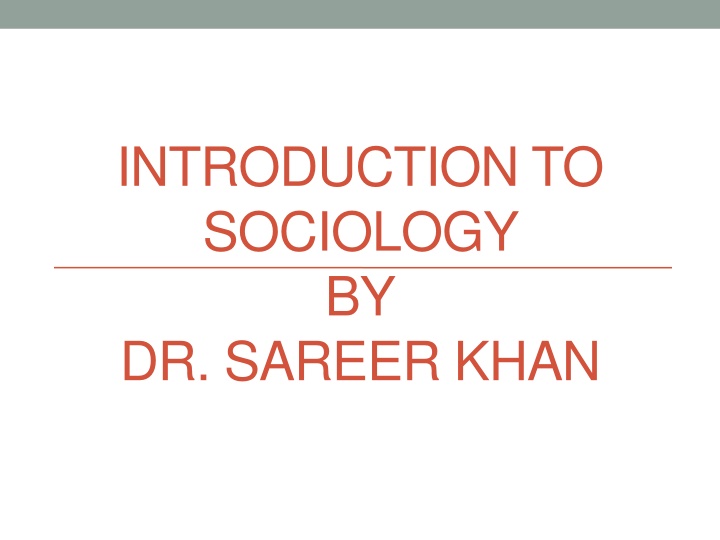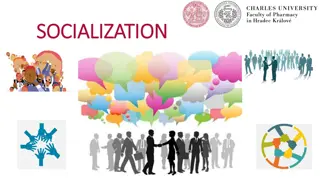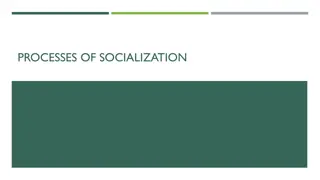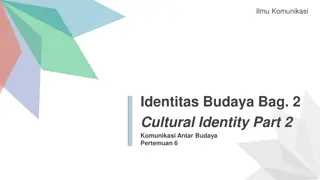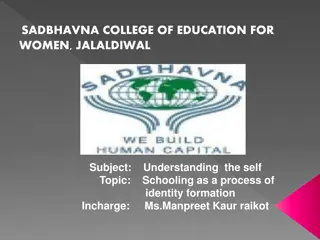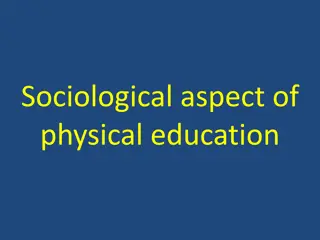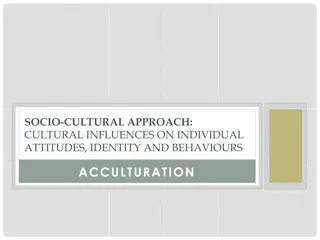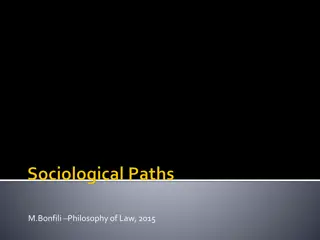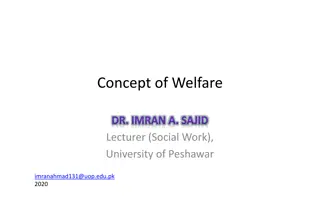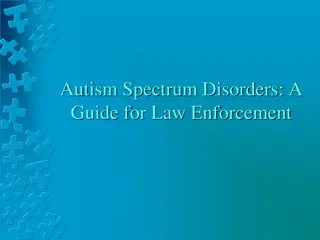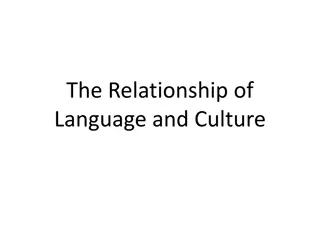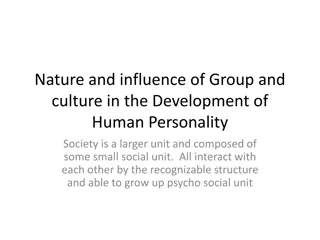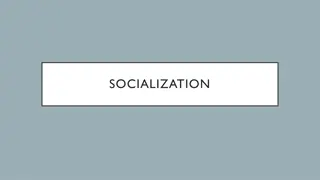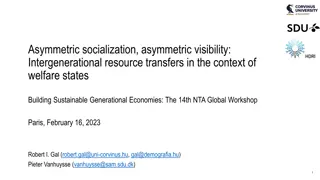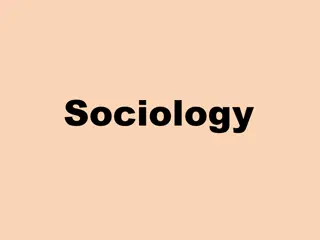Socialization Process and Characteristics
Socialization is a vital process where individuals learn societal attitudes, values, and behaviors through interactions. It shapes personalities and enables the transmission of social norms between generations. It instills discipline, helps control human behavior, and is influenced by the harmony among socialization agents. The rapidity of socialization is affected by the coherence of transmitted values and skills. Understanding socialization is key to comprehending how individuals adapt and integrate into society.
Download Presentation

Please find below an Image/Link to download the presentation.
The content on the website is provided AS IS for your information and personal use only. It may not be sold, licensed, or shared on other websites without obtaining consent from the author.If you encounter any issues during the download, it is possible that the publisher has removed the file from their server.
You are allowed to download the files provided on this website for personal or commercial use, subject to the condition that they are used lawfully. All files are the property of their respective owners.
The content on the website is provided AS IS for your information and personal use only. It may not be sold, licensed, or shared on other websites without obtaining consent from the author.
E N D
Presentation Transcript
INTRODUCTION TO SOCIOLOGY BY DR. SAREER KHAN
CHAPTER NO. 04 SOCIALIZATION AND PERSONALITY DEVELOPMENT
What is socialization Socialization : A human child is helpless at birth Despite other animals, it cannot live for a few hours without other s help but it can learn to become a complete human being and he learns everything from a society. This process complicated, is called socialization, which occurs through social interaction including family members and relations, playmates and teachers. Social training is a process that continues from birth to death and there is a link between an individual and society without which no individual of learning, which is with near people can live.
Definition of socialization 1. RT. Schaefer : Socialization is the process whereby people learn the attitude, values and actions appropriate to individuals as members of a particular culture, 2. Robertson Jan : Socialization is the process of social interaction through which people acquire personality and learn the way of life of their society , 3. Bogardus: A process of learning to live and work together is called socialization. 4. Ogburn and Nimkoff : It is the process of learning the norms of the group and society "
Character tics of Socialization Socialization not only helps in the maintenance and preservation of social values and norms but it is the process through which values and norms are transmitted from one generation to another generation. 1. Inculcates basic discipline: Socialization inculcates basic discipline. A person learns to control his impulses. He may show a disciplined behavior to gain social approval.
2. Helps to control human behaviour: It helps to control human behaviour. An individual from birth to death undergoes training and his, behaviour is controlled by numerous ways. In order to maintain the social order, there are definite procedures or mechanism in society. These procedures become part of the man s/life and man gets adjusted to the society. Through socialisation, society intends to control the behaviour of its-members unconsciously.
3. Socialization is rapid if there is more humanity among the- agencies of socialization: Socialisation takes place rapidly if the agencies of socialisation are more unanimous in their ideas and skills. When there is conflict between the ideas, examples and skills transmitted in home and those transmitted socialization of the individual tends to be slower and ineffective. by school or peer,
4. Socialization takes place formally and informally: Formal socialization takes through direct instruction and education in schools and colleges. Family is, however, the primary and the most influential source of education. Children learn their language, customs, norms and values in the family. 5. Socialization is continuous process: Socialization is a life-long process. It does not cease when a child becomes an adult. As socialization does not cease when a child becomes an adult.
Functions of Socialization It converts humans from biological being to social being It contributes in personality development It helps to become disciplined It helps to perform different roles It establishes knowledge and skills It contributes in the stability of social order It transmits culture from one generation to other It creates right aspirations in social life
Stages of Socialization 1. Primary Socialisation: Primary socialization refers to socialization of the infant in the primary or earliest years of his life. It is a process by which the infant learns language and cognitive skills, internalizes norms and values. The infant learns the ways of a given grouping and is molded into an effective social participant of that group. The norms of society become part of the personality of the individual. The child does not have a sense of wrong and right. By direct and indirect observation and experience, he gradually learns the norms relating to wrong and right things. The primary socialization takes place in the family.
2. Secondary Socialization: The process can be seen at work outside the immediate family, in the peer group . The growing child learns very important lessons in social conduct from his peers. He also learns lessons in the school. Hence, socialisation continues beyond and outside the family environment. Secondary socialisation generally refers to the social training received by the child in institutional or formal settings and continues throughout the rest of his life.
Types of Socialization Authoritarian Socialization In which the people have authority over the people like parents, teachers etc. 2. Equalitarian Socialization: In which the people are equal in the process of socializations.
Agencies of socialization Socialization covering whole life is affected by several social forces. In all the societies of the world, family is considered as the most important institution which is socialization, especially in childhood. In addition, other elements like group of companions, school, communication and professions have importance for personality and socialization. The following agencies are given below with examples in brief detail. the most effective in
Agencies of socialization 1.Family The most effective and deep relation is of family in the process of socialization by imprinting at intense and deep effects on an individual. It is the family that takes care of a child, his birth and provides sense of self, teaches to walk, to talk, to memories and provides a sense of 'society. By making the child learn different behaviors according to different situations and reactions to those, his personality is developed but it has its base in the family. It is the family that provides a sense of gender and gender role interaction having long-lasting The part of culture that learnt in family, dominates the individual s life and that is why family is said to be a center for socialization of an individual and these effects are very deep in Melvin, in his research, has described three reasons because of which family : affects. Pakistani culture. effects are deeper :
Agencies of socialization i. The first institution with which an individual is introduced, is family and an emotional relation is all encompassing him all the life without any relation with the outer world. ii. A family socializes a child consciously but this interaction makes the personality strong through unintended behaviors. iii. A specific importance in the structure of a family makes its effects more long-lasting because the position and ascribed status of an individual is with reference to his family and the interaction is also in the background of a family making family religion, race, class, values and tradition are more important.
Agencies of socialization 2. Schools : In providing formal socialization, schools and other institutions are included. A school is an institution to teach knowledge and skills according to rules and regulations in a formal manner. Before industrial societies, institutions were not present in formal position and in the post industrial societies, their need and importance has increased very much. They have decreased the family effects and their benefits because they have attained the status of total institutions. This institution along with teacher, students and environment teaches the social norms, traditions, beliefs and values and ensures their fast effects on the minds of the individual to fulfill the social expectations of the society. That is why, the social training of the school has deep effects on the minds of the individuals and their personality.
Agencies of socialization 3. Peer Group : As soon an individual grows up, he establishes his relations with his peer group. As these relations grow more, family importance becomes less because of his own type people, freedom from role status and his liking of, and his liking instead of compulsion. A sense of selection is evoked in him and them gives freedom of making decisions with confidence, thus learning new social roles. For instance, different roles and responsibilities in a game or play establish a balance between peer group and school and provide a traditional stage to the socialization, adopting in the practical life. Informal ways in family and formal ways in school are tried among peers and keeping its social reaction in view makes them as part of our personality and in practical life we behave according to it.
Agencies of socialization 4. Mass Media : Mass media is a wonderful invention of the twentieth century and this has got an important place in socialization of individuals. Before this development, stories and songs were part of social life of the individual but today the effects of TV and internet start to effect even in the early life of school and peer group. TV provides the practical training of role play and imitation and plays a part in the mental and personality growth of an individual. All means of communications give awareness about the environment to the individual and provide social information providing him with more alternatives in the selection of role,behavior and thoughts. It makes one understand one s culture more and gives a facility to compare it with other cultures and increases one s ability of amendment to re-mobilize himself.
Agencies of socialization 5. These a. Religious trend in family diverts the individual to masjid where masjid has secondary effects of increasing or decreasing his tendency and as a result of this an individual is either attached to religion or avoids religion matter because of his b. The position of mosque as a pleasant environment or a total institution influence the personality of an individual to the extent of totally making his every movement an expression of his attachment Religious affect Institutions socially : an individual in two ways: disliking the religion. with religion.
Agencies of socialization 6. Occupation : In the secondary stage of socialization, profession is an important source. A profession gives an edge to ways of life, thought affecting the intelligence and becomes a total institution for the socialization of an individual. Total institution refers to institution, which regulates all aspects of a person s life under a single authority. A profession affects in the following manner : i. All activities of life become an axis of professional activities. ii. All of these activities are associated with his professional fellows. iii. These activities require all attention, skill and effort for the achievement of aims of that profession.
Agencies of socialization 7.Neighborhood Neighborhood plays an important part in our socialization with reference to social interaction. If it is a part of group life, an individual s early social life is affected. In Village and agrarian societies, neighborhood has depth and nearness and its effects resemble those of a family. But in modern urban societies, distinctness and coldness about neighbor, thus having no effect on personality. : there is
Personality Personality Personality is a purely human quality and is a very complicated instinctual organization. It is the thoughts and character, interests and behaviour even it is the philosophy of life of a person. There is nothing more interesting than personality topic. Husband wife, officer and subordinate and capitalists and labourers are all on the way of finding the personality of one another.
Definitions of personality l. Alpert : Such a dynamic organization of psychological and functional system of an individual, that determines ideal adjustment with environment is called a personality." 2. Dr. Mun : The personality is the most characteristic integration of an individual s structure, modes of behaviour, interests, attitude and capacities, especially when considered from the stand-point of adjustment in social situation. 3. McDougall : The complete organization of heredity features and natural tendencies is called personality."
Factors of Personality Biological : There is a theory that "the personality of an individual resembles his parents is heredity factor." Intelligence of an individual, his tendency, physical built and innate tendencies and needs play an important part in building personality. Social Environment : An individual is a biological unit at the time of its birth but to say that he is just a clot of blood is wrong but in the form of genes, there are numerous characteristics which brought it up' in a specific environment but it is a complicated action. However, the personality building is done through mutual interaction of social environment and heredity. Heredity is out of our control but environment can be controlled and can affect the personality directly. Situational Factors It is based on the situations.
Cultural Factors From the very birth of a child, he is under the influence of culture. The traditions and customs of family or tribe influence his life from the very first day. Every child is born in a specific sub-culture and afier a few years, he comes to know that he is to live in a culture and to lead a successful life. Therefore, he has to adopt the aims, thoughts, views, dealing and viewpoint of the culture, according to its social values and his personality becomes a representative of the culture. Religious Factors: Based on the religious activities or on religion.
Self Looking Theory Charles Horton Cooley: Charles Horton Cooley believed, personality arises out of people s interactions with the world. Cooley used the phrase Looking Glass Self to emphasise that the self is the product of our social interactions with other people. To quote Cooley, As we see our face, figure and dress in the glass and are interested in them because they are ours and pleased or otherwise with according as they do or do not answer to what we should like them to be; so in imagination we perceive in another s mind some thought of our appearance, manners, aims, deeds, character, friends and so on and variously affected by it .
The looking glass self is composed of three elements: 1. How we think others see in us (I believe people are reacting to my new hairstyle) 2. What we think they react to what they see. 3. How we respond to the perceived reaction of others. For Cooley, the primary groups to which we belong are the most significant. These groups are the first one with whom a child comes into contact such as the family. A child is born and brought up initially in a family. The relationships are also the most intimate and enduring.
According to Cooley, primary groups play crucial role in the formation of self and personality of an individual. Contacts with the members of secondary groups such as the work group also contribute to the development of self. For Cooley, however, their influence is of lesser significance than that of the primary groups. The individual develops the idea of self through contact with the members of the family. He does this by becoming conscious of their attitudes towards him. In other words, the child gets his conception of his self and latter of the kind of person he is, by means of what he imagines others take him to be Cooley, therefore, called the child s idea of himself the looking glass self.
The looking glass self assures the child which aspects of the assumed role will praise or blame, which ones are acceptable to others and which ones unacceptable. People normally have their own attitudes towards social roles and adopt the same. The child first tries out these on others and in turn adopts towards his self. The self thus arises when the person becomes an object to himself. He is now capable of taking the same view of himself that he infers others do. The moral order which governs the human society, in large measure, depends upon the looking glass self
This concept of self is developed through a gradual and complicated process which k continues throughout life. The concept is an image that one builds only with the help of others. A very ordinary child whose efforts are appreciated and rewarded will develop a feeling of acceptance and self-confidence, while a truly brilliant child whose efforts are appreciated and rewarded will develop a feeling of acceptance and self confidence, while a truly brilliant child whose efforts are frequently defined as failures will usually become obsessed with feelings of competence and its abilities can be paralyzed. Thus, a person s self image need bear no relation to the objective facts.
A critical but subtle aspect of Cooleys looking glass is that the self results from an individual s imagination of how others view him or her. As a result, we can develop self identities based on incorrect perceptions of how others see us. It is because people do not always judge the reactions of others accurately, of course and therein arise complications
